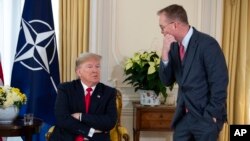U.S. President Donald Trump said Tuesday a new trade agreement with China might have to wait until after the November 2020 presidential election, with Washington and Beijing stymied in reaching a negotiated end to their two-year trade and tariff conflict.
"I have no deadline, no," Trump said in London, where he was attending a meeting of NATO leaders. "In some ways, I like the idea of waiting until after the election for the China deal. But they want to make a deal now, and we'll see whether or not the deal's going to be right; it's got to be right."
U.S. and European stock prices plunged on Trump's comments, while the Chinese yuan currency dipped to a five-week low, which could dash hopes for a year-end trade war truce between the U.S., the world's biggest economy, and No. 2 China.
Trump's China trade remarks came a day after he said he would impose tariffs on Brazil and Argentina for "massive devaluation of their currencies."
Washington also threatened duties of up to 100% on French imports, including high-end champagne and handbags, in a dispute over a digital services tax that the U.S. says hurts its technology companies.
But after meeting in London, both Trump and French President Emmanuel Macron expressed optimism that the dispute between the two countries could be resolved. Trump called it a "minor" disagreement, while the French leader said he thinks the conflict can be settled.
Trump said he thinks the two countries might be able to agree on a "mutually beneficial tax." The U.S. leader said he was more concerned about the U.S. trade deficit with the European Union, with $109 billion more in European goods being shipped to the U.S. last year than American products being sent across the Atlantic to Europe.
One of the hallmarks of Trump's three-year presidency has been his tit-for-tat tariff war with Chinese President Xi Jinping on hundreds of billions of dollars worth of goods being sent between the two countries and disputes over business rules for American and Chinese companies operating in each other's country.
In the first year of Trump's White House tenure, the two counties agreed to a 100-day plan to resolve trade differences. But the road to any agreement has been filled with potholes -- intermittent negotiations, often with weeks and months between talks, threats of more tariffs and then imposition of some of the levies.
In October, Washington and Beijing announced a "phase one" agreement, but they have yet to sign it.
In remarks alongside NATO Secretary-General Jens Stoltenberg, Trump said signing a deal with Beijing was up to himself.
"The China trade deal is dependent on one thing - do I want to make it, because we are doing very well with China right now, and we can do even better with a flick of a pen," Trump said. "And China is paying for it, and China is having by far the worst year that they have had in 57 years. So we'll see what happens."
In October, China reported its slowest economic growth in 27 years.
Days ago, Trump signed legislation, over Beijing's protests, supporting anti-government demonstrators in China-controlled Hong Kong. The U.S. leader said the measure was not making trade negotiations with China easier, but that he still thinks Beijing wants to reach a trade agreement.
The U.S. has threatened to impose a new 15% tariff on about $156 billion worth of Chinese imports on Dec. 15, including Chinese-made laptops and smartphones.
U.S. Commerce Secretary Wilbur Ross has said the mid-December date would be a natural deadline for any agreement if one can be reached.
But the commerce chief told CNBC that while staff-level talks with China are continuing, no high-level negotiations are scheduled.





